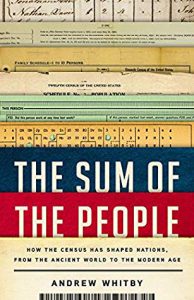 This week we’re looking at a history of the origins and current uses of the census – at the very time the United States Census officially begins. This week, we’re looking at The Sum of Us The People by Andrew Whitby.
This week we’re looking at a history of the origins and current uses of the census – at the very time the United States Census officially begins. This week, we’re looking at The Sum of Us The People by Andrew Whitby.
I don’t exactly hide the fact that despite reading quite a few books, at heart I’m a numbers and computing guy. And few things get more numeric than efforts to count literally billions of people around the world in the span of just a year or two – the very subject of this book, and efforts that officially began a couple of months ago when this post (and the book it is about) are published. (I sit here writing this post on New Year’s Day 2020, having made this book the first book I read in the year the Census begins in the US.)
And y’all, Whitby does a seemingly excellent job of taking a complex and complicated subject like the modern realities of counting people – particularly when such counts can lead to shifts in power – and boiling it down so that anyone, even those without the mathematical foundations Whitby and I share a portion of, can understand what is happening, why, and why both are important. He states early on that a primary goal is writing a book that can be understood by most anyone, and to me it seems he has done an exemplary job of this.
I might nitpick about his discussions of the beginnings of computing and even the mathematics of statistics as its own field of study (among others), but neither does my own cursory knowledge of those areas allow me to outright refute them. So while I tend to think that he *may* have overstated his case in believing that these things came about due to a need to count people, I cannot be positive of this and his arguments are well documented and worthy of critical examination. (And here, he has provided nearly 25% of this text in notes and bibliography – generally a sign of a very thoroughly researched and presented discussion, in my experience.)
Truly a fascinating book, and one anyone remotely interested in the how or why of a census should read. Very much recommended.
As always, the Amazon/ Goodreads review:
Intriguing Book for Census Year. This book is currently scheduled to be released the day before Census Day and does an admirable job of tracing the concept of a census from its ancient origins through to its current uses, implications, and complexities. In that regard, it is very similar to Radley Balko’s 2012 work Rise of the Warrior Cop, which traced policing in America in a similar fashion. Eye opening in many respects, head scratching in maybe a couple, this is absolutely a book that should be well read as the world goes into what the author proclaims as possibly the last global census as we currently understand it. Very much recommended.
